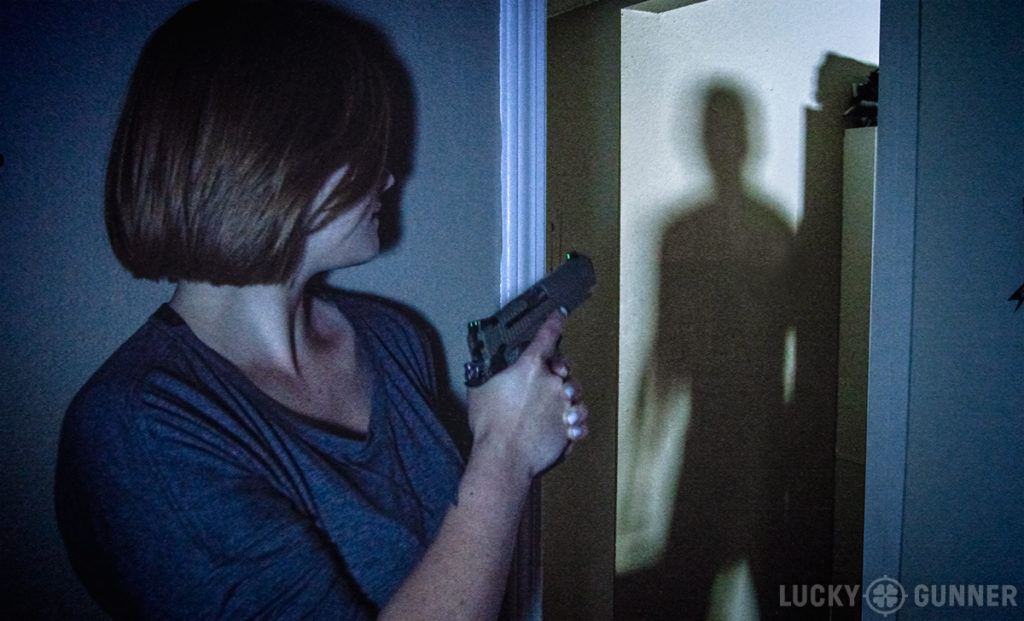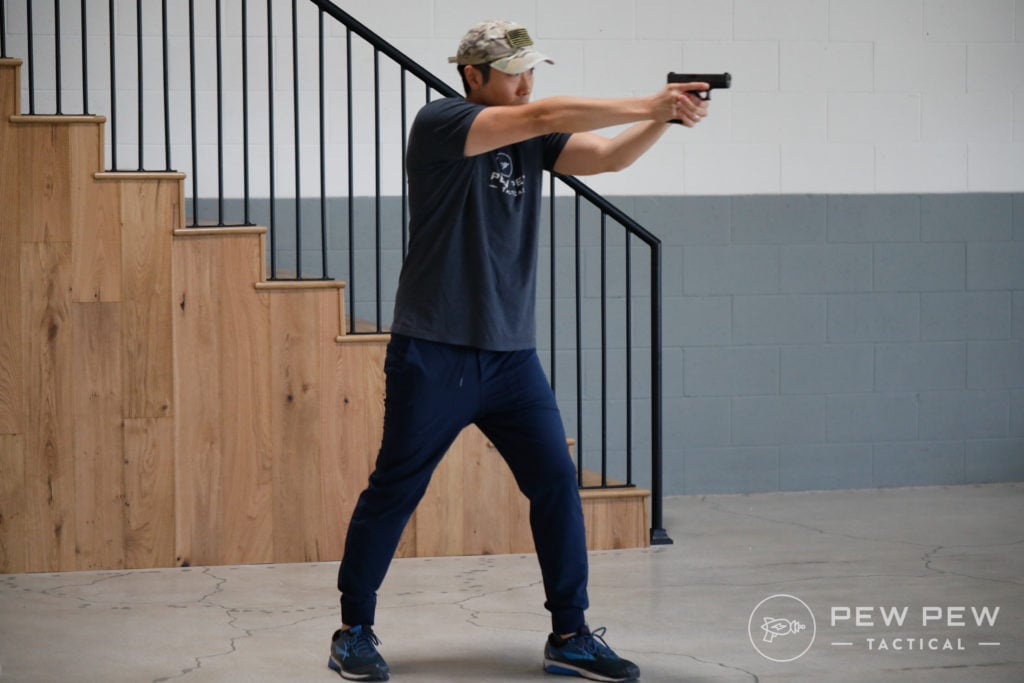Self-defense is usually one of the top reasons for gun purchases.
We no longer live in the Wild West, though. So, there are actual laws for self-defense with deadly weapons.

The two most common ones being Castle Doctrine and Stand Your Ground.
We know that navigating the world of legalese can be difficult and downright confusing, so we’re here to help clear up the legal fog.

Prepare to walk away from this article with the knowledge of what Castle Doctrine and Stand Your Ground laws are and how they are applied.
Ultimately, we’ll guide you through how these laws affect your right to defend yourself.

Disclaimer: While the information provided here is legal in nature, it is not to be construed as legal advice and is for educational and entertainment purposes only.
Table of Contents
Loading…
Castle Doctrine vs. Stand Your Ground
First things first, it’s important to understand exactly what Castle Doctrine and Stand Your Ground laws actually are and what they cover.
Castle Doctrine
The general idea behind Castle Doctrine is that your home is your “castle,” and you have a right to defend it…with lethal force if necessary, rather than retreat from your home.

Different states have different degrees of the Castle Doctrine, however. So, you’ll need to be aware of the specifics of the Castle Doctrine in your state.
Stand Your Ground
Stand Your Ground laws are much more straightforward.
As the name implies, the law allows you to stand your ground to defend yourself.

This means you do not have a duty to retreat.
You can defend yourself, using lethal force, if necessary, as long as you are somewhere you are legally allowed to be.
What Do These Laws Actually Do?
Knowing the law is one thing, but having to rely on it is another thing entirely.
It’s important to keep in mind that even if your state has both the Castle Doctrine and Stand Your Ground laws in effect, these laws are justifications for self-defense, not a license to shoot people.
Castle Doctrine in Practice
There are varying degrees of the Castle Doctrine in place across the U.S., including states without explicit Castle Doctrine. Though you are still allowed to defend yourself under a Stand Your Ground law in most of those situations.
The Castle Doctrine in California, for example, does not place a duty to retreat on residents if someone has unlawfully entered their home with the intent to commit a felony.

However, California’s Castle Doctrine only allows for the use of force in self-defense if the person defending himself had a reasonable fear of imminent peril of death or great bodily injury to himself, his family, or a member of the household.
The Castle Doctrine would not be a valid defense if someone broke in and was stealing a laptop or TV. That would not qualify as a threat of death or injury to anyone.

Compare California to a state like Florida, which has a very strong Castle Doctrine.
In Florida, you are justified in using deadly force in self-defense if necessary, inside your home, the porch attached to the home, a mobile home, a car, or even a tent.
As long as you are in your own property, you can defend yourself however necessary.
Standing Your Ground in Practice
Unlike the Castle Doctrine, about half the states in the U.S. do not have a Stand Your Ground law in effect.
This is slightly misleading, though.
In states like California, while there is no actual Stand Your Ground law, jury instructions provide a Stand Your Ground defense to acquit someone accused of homicide.

You’ll definitely want to double-check your state laws to know if you can defend yourself when threatened or if you have a duty to retreat from the situation.
If your state has Stand Your Ground laws, that typically means that as long as you are somewhere you’re legally allowed to be — like a restaurant, store, or parking lot — and you are faced with an imminent threat to yourself or a loved one, you are justified in using whatever force is appropriate to defend yourself…without trying to escape the situation first.

Florida is probably one of the more well-known states for Stand Your Ground laws.
It shouldn’t be a surprise (considering the strength of Florida Castle Doctrine) that the state would allow you to defend yourself with deadly force rather than retreat if you are somewhere you are legally allowed to be.
A state without Stand Your Ground laws, on the other hand, essentially requires you to run away from any threat rather than try to face it and resolve the issue.

New York, for example, does not have a Stand Your Ground law in effect.
This means you have a duty to retreat if it is safe to do so. If there is absolutely nowhere for you to run, then you are justified in using self-defense, but only as a last resort.
The Castle Doctrine, Stand Your Ground laws, and You
Knowing whether your state has either Castle Doctrine or Stand Your Ground laws (or both) on the books is an essential part of being a gun owner.
You never know when you will need to use your self-defense training to defend yourself and loved ones.
And you’ll want to be aware of what the law permits you to do if you need to defend yourself.

Ultimately, you need to understand if faced with an imminent threat of death or great bodily harm, do you have to try and escape from the situation, or can you face it head-on, using whatever amount of force is necessary?
One more important note: even if you do not have a duty to retreat, it does not mean trying to remove yourself from a situation is not the best option.
Sometimes, fleeing, if you can, is the BEST idea.

In the meantime, it can’t hurt to get in some extra time at the range to practice and hone those skills if you ever need them!
Conclusion
Using deadly force, even in self-defense, is a difficult decision that should not be taken lightly. But understanding what your state allows in terms of Castle Doctrine and Stand Your Ground is an essential part of making an informed decision.

As always, consult the laws in your local area to get the most up-to-date information regarding your state’s laws. Or you can always talk to your friendly neighborhood attorney for more information.
Does your state have Castle Doctrine or Stand Your Ground? Sound off in the comments below. Also, be sure to check out our guides on gun laws and concealed carry laws by state. Or dive further into gun law terminology with our explanation of Red Flag Laws.









3 Leave a Reply
In my town a man was allowed to kill another because of "Stand your ground" There was some kind of road rage incident, unexpained to the public. The aggressor ,who was otherwise not a criminal, followed the shooter to a crowded parking lot in the daytime, and blocked him in. instead of locking his doors and calling for aid, the shooter confronted the man possibly with his hand on his gun.The other man is said to have chocked him, he shot him I believe more than once . Verdict -self defense.So will every angry guy fist fight now become justifiable homicide?
Good information, Thank you! I would suggest taking it to the next level...what to expect if you do defend yourself and wound or kill in self defense. I, and I'm sure others, have heard horror stories of jail pending a trial in a self defense case, wounded intruders suing the homeowner for injuries incurred, confiscation of weapons, etc., but I've always wondered if they were true. What does, or can, really happen? Thanks again!
Hi Mark, I'm glad you found the information helpful!
With regards to what to expect should you ever actually need to defend yourself, I too have heard the horror stories, and the info might make for a good follow-up article! In the meantime, it might be helpful to check out some of our articles on CCW insurance, as most of the companies provide legal services for this very situation, and they may have attorneys who would be able to give you additional information on what you might expect after a shooting.